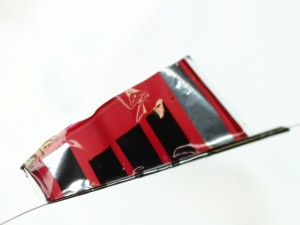Ultrathin organic photovoltaic device is thinnest ever


Extreme bending flexibility demonstrated by wrapping a solar cell around a 35-μm-radius human hair. ? Takao Someya
Progress in electronic technology is driven by advances in materials science, processing capabilities, and ingenuity of form. Future application-specific requirements for lighting, displays, and photovoltaics will include large-area, low-weight, and mechanical resilience for dual-purpose uses such as electronic skin, textiles, and surface conforming foils.
A research group at the University of Tokyo’s Graduate School of Engineering has demonstrated polymer-based photovoltaic devices on a plastic foil substrate less than two μm thick, with equal power conversion efficiency to glass-based counterparts.
This ultrathin organic photovoltaic (OPV) can reversibly withstand extreme mechanical deformation and has unprecedented solar cell specific weight. Instead of a single bend, the researchers formed a random network of folds within the device area. The device was created using standard processing methods, so the same weight and flexibility should be achievable in LEDs, capacitors, and transistors to fully realize ultrathin organic electronics. These ultra-thin organic solar cells are over ten times thinner, lighter, and more flexible than any other solar cell of any technology to date.
Press release (Japanese)
Paper
Martin Kaltenbrunner, Matthew S. White, Eric D. G?owacki, Tsuyoshi Sekitani, Takao Someya, Niyazi Serdar Sariciftci, Siegfried Bauer,
“Ultrathin and lightweight organic solar cells with high flexibility”,
Nature Communications 3 (770), doi: 10.1038/ncomms1772.
Article link
Links
Graduate School of Engineering
Electrical and Electronic Engineering and Information Systems
Exploratory Research for Advanced Technology (ERATO), Japan Science and Technology Agency (JST)







